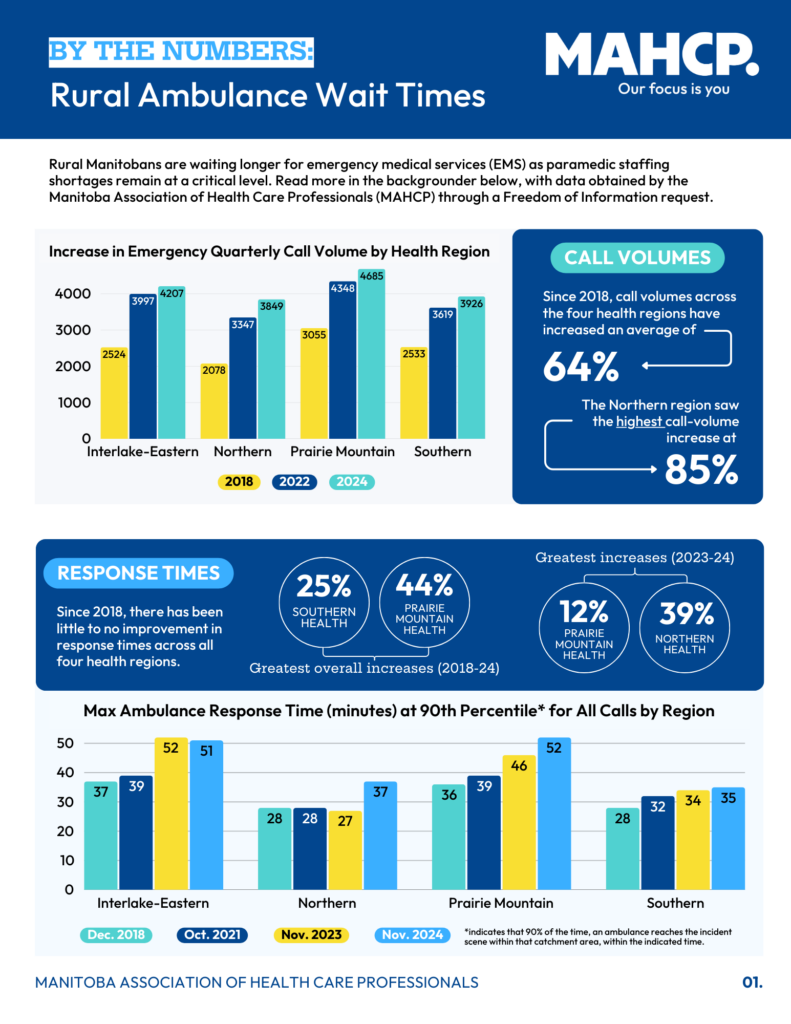Rural Ambulance Wait Times, Out-of-Service Hours
Hit New Peaks Due to Paramedic Shortage
28% of Paramedic Positions Vacant
February 10, 2025 – Rural Manitobans are waiting longer for emergency medical services and more ambulances are sitting idle as paramedic staffing shortages remain at a critical level, according to new data obtained by the Manitoba Association of Health Care Professionals (MAHCP) through a Freedom of Information request. View our backgrounder of tables.
“Despite the Manitoba Government’s commitment to fixing health care, ambulance response times in rural communities are still getting worse,” said Jason Linklater, President, MAHCP. “Paramedics are committed to providing care, but they are struggling with ongoing staffing shortages combined with higher call volumes and intensifying social challenges, including on-the-job violence.”
Key Findings
- Rural ambulances were out of service, on average, almost 30,000 hours each month due to staffing shortages in 2024 (i.e., two paramedics were not available to staff the ambulance), a 400% increase since 2020.
- Maximum response times at the 90th percentile have reached over 50 minutes in Western Manitoba (Prairie Mountain Health region) and Interlake-Eastern, a new record – target is under 30 minutes.
- Response times increased year-over-year in Prairie Mountain (+12%) and Northern (+39%) Health Regions from November 2023 to November 2024. There was no significant change or improvement in response times for Interlake-Eastern and Southern Health Regions.
- Since 2018, overall call volumes have increased an average of 64% across the four health regions, with the Northern Health Region seeing the highest call-volume increase at 85%.
- An estimated 28% of Shared Health paramedic positions are vacant – over 200 of roughly 800 positions – representing only a slight improvement from 30% in January 2023.
While Budget 2024 set a goal of adding 90 net new paramedics, the province’s data reveal a net gain of only 14 paramedics between April 1 and December 31, 2024.
MAHCP is calling on the Government of Manitoba to take immediate steps to not only retain the experienced paramedics working today, but also begin rebuilding rural Emergency Medical Services, by:
- Working with frontline paramedics and the union on common-sense solutions to improve working conditions and work-life balance;
- Settling a fair, competitive collective agreement for allied health professionals, including paramedics, who have been working under an expired contract for 10 months;
- Developing and fast-tracking new, accessible primary care paramedic (PCP) training opportunities for rural Manitobans; and,
- Promoting and supporting careers in paramedicine to ensure training seats are filled.
“Manitobans living and traveling in rural areas deserve equal access to medical care,” said Linklater. “No one should be waiting this long for help in a medical emergency, nor should they be waiting this long for meaningful action to address wait times that are still rising. Solutions are in reach.”
-30-
FOR MEDIA INTERVIEWS
Karen Viveiros or 431-323-7499
The Manitoba Association of Health Care Professionals (MAHCP) represents more than 7,000 publicly-employed allied health professionals working in more than 50 specialized disciplines in labs, clinics, hospitals, community and long-term care. Our members include paramedics, lab and imaging technologists, respiratory therapists, mental health clinicians, and many more. Allied health is the only public health-care sector without a new collective agreement; their contract expired March 31, 2024.

